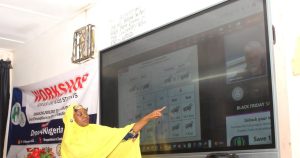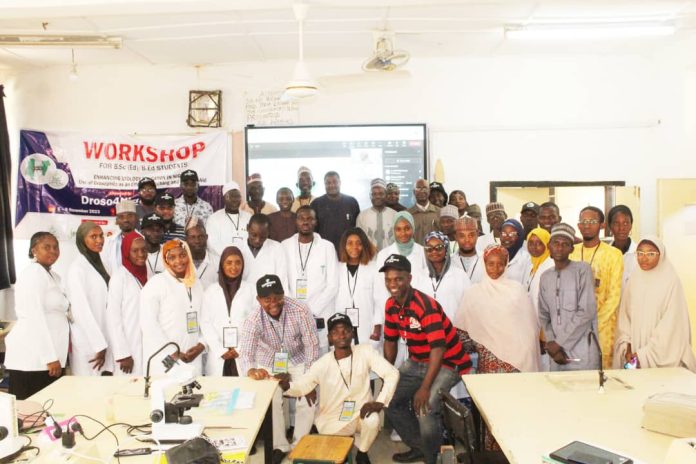By Abdulrasheed Akere
The sole practical lesson during Ibrahim Umar’s three-year biology education journey focused on teaching practice, where he lacked the necessary tools for effective instruction until he was selected for Droso4Nigeria workshop.
As a 300-level student majoring in Education Biology at Federal University Gusau in Zamfara state, he faced the challenge of making abstract biology concepts more tangible for his students.
In July 2023, Ibrahim’s eagerness to expand his learning beyond university walls led him to apply for the Droso4Nigeria workshop. His selection, confirmed on a fortunate Saturday in September, marked his first visit to Ahmadu Bello University (ABU) Zaria.
From November 06 to November 08, the transformative 3-day workshop brought together Ibrahim and 20 other students from seven universities in the northwest and northeast geo-political zones of Nigeria. Hosted by ABU Zaria, the workshop aimed to enhance the use of Drosophila as a teaching and learning aid.
Droso4Nigeria, a non-profit educational organization based in ABU Zaria, was founded in 2018 to promote the use of Drosophila in schools and research. Driven by a volunteering system, the organization conducts workshops for teachers, researchers, and students through outreach programs.
According to research published by ResearchGate, the lack of practicals in biology education in Nigeria has led to a decline in the number of students choosing biology as a subject in secondary school and pursuing it further at the university level.
This is because many students find the subject too theoretical and challenging without the opportunity to apply what they learn in practical experiments.
Furthermore, the lack of practicals has resulted in a decline in the quality of teaching and learning of biology, as teachers are not adequately equipped to teach the subject without practical experiments. In fact, many teachers have not received any training in practical biology, which has further exacerbated the problem.
What birthed the initiative
Motivated by the challenges identified in a 2014 Postgraduate Diploma in Education assessment, Dr. Rashidatu Abdulazeez, a co-founder of Droso4Nigeria, explained that the organization’s genesis addressed issues such as a lack of resources, insufficient teaching periods, complex topics, and terminology overload in biology.
Since its inception, Droso4Nigeria has trained 302 students and 128 teachers through eight outreach programs. The recent workshop focused on “Enhancing biology education in Nigeria: Use of Drosophila as an effective teaching and learning aid.”

Dr. Rashidat emphasized, “This year’s Droso4Nigeria workshop distinguishes itself by directing its focus toward college students as the primary audience. A significant shift occurred with notable contributions from indigenous organizations like CAMRET-UDUS and BioRTC, emphasizing an augmented commitment from conscientious individuals in Nigeria aside from the hub’s co-founders. Furthermore, participants in this edition exhibit a heightened awareness of media, showcasing an unprecedented dedication that signals a promising shift in shaping the future of biology in Nigeria. Additionally, the workshop addressed the funding challenges through a focus on bio-entrepreneurship.”
The management of Droso4Nigeria further urged, “Trainees should apply their acquired knowledge beyond teaching biology, embracing innovative approaches for a student-centered learning experience. We advocate for broader support of education and related activities by the good citizens of this great country. Investing in the future through enhanced education and an improved system is crucial. Let’s collectively ensure a brighter future by contributing as little as #1,500 for a hand lens, reducing reliance on government intervention.”
“Droso4Nigeria looks to its trainees to become outstanding ambassadors of the hub’s mission, making positive contributions to education in their respective localities and innovating ways to enhance the educational landscape in Nigeria.”
Dr. Rashidatu emphasized the workshop’s unique focus on college students, highlighting contributions from indigenous organizations and addressing funding challenges through bio-entrepreneurship.
Droso4Nigeria encourages trainees to apply their knowledge beyond teaching biology, advocating for broader support of education in Nigeria. Despite its impactful mission, Dr. Rashidatu highlighted funding as a persistent challenge, appealing to fellow Nigerians to sponsor the organization’s activities for the advancement of education in communities.”
Beyond educational knowledge, Muhammad Salisu from Federal University Dutse, Jigawa State, gained distinguished skills in bio-entrepreneurship and domestic entrepreneurship. “Droso4Nigeria gave us knowledge, how to use it, and a source of income. It was a rare life-changing experience where inspiration was aroused in like-minded students. I was bestowed an opportunity to network with different students of diverse backgrounds.”
Muhammad encouraged other students to always apply for such workshops to learn, unlearn, and relearn. He expressed a wish that this kind of sponsored workshop would be made readily available for students at all levels of education.
During the workshop, Ibrahim gained valuable insights into activity-based teaching approaches, PowerPoint presentation optimization for biology teaching, and the use of visual aids. He highlighted the transformation in his teaching methods, making biology more engaging with visuals, charts, images, and animations.
Another participant, Idris Alimat Sadiat, expressed how the workshop expanded her knowledge of Drosophila and inspired her to become a teacher. Muhammad Salisu from Federal University Dutse gained skills in bio-entrepreneurship, emphasizing the workshop’s life-changing experience.
Limitations
While speaking on the limitations of the organization, Dr Rashidatu said funding has been a persistent challenge that is hindering the mission of Droso4Nigeria.
She said, “We appeal to fellow Nigerians to sponsor Droso4Nigeria’s activities, conducted thrice a year for three distinct audiences. Your support is crucial in aiding our donations to secondary schools and contributing to the advancement of education in our communities. We can also be contacted to train teachers on innovative ways of teaching biology.”




